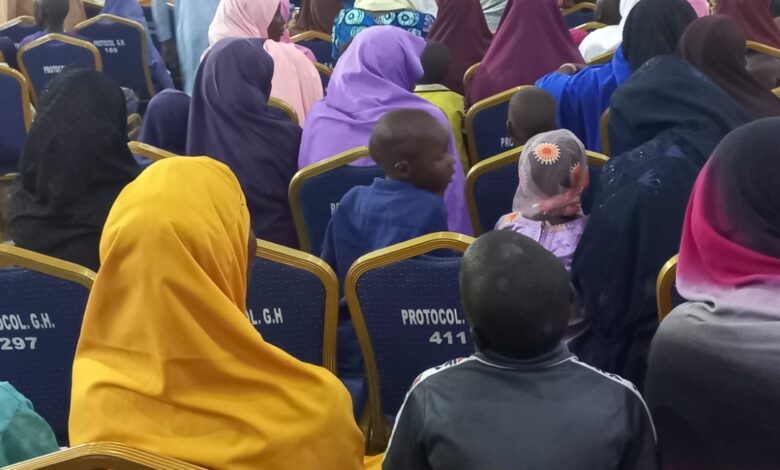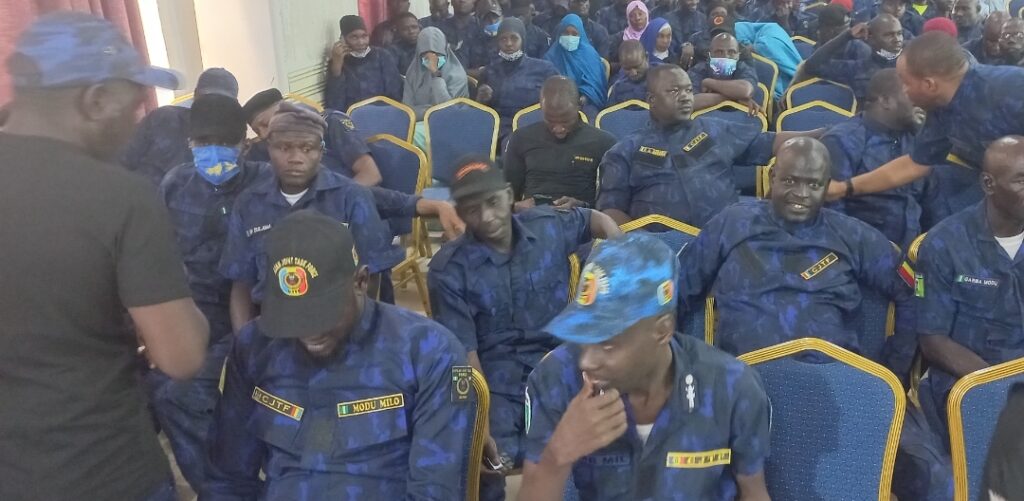Widows Of Borno’s Slain Volunteer Soldiers Speak On Life Without Their Husbands
Most members of the Civilian JTF, a volunteer vigilante group in Borno State, Northeast Nigeria, who were killed while helping the Nigerian military fight Boko Haram, left behind wives and children who have not been given commensurate support by the government.

The first of October is to every Nigerian a special day when citizens celebrate the anniversary of the nation’s independence. But to Hadiza Jubrin, a widowed mother of three from Borno State Northeast Nigeria, for the past seven years, that day has meant something different to her family.
The 34-year-old single mother said she no longer looks forward to Independence Day the way she used to, because “it constantly brings back sad memories.”
The first day of October was the day she was plunged into widowhood – a day she was embraced by darkness.
“My husband was killed by a female suicide bomber who hugged him on Oct. 1, 2015, when he tried to stop her from invading a crowded place in front of our home,” she said.
Hadiza is one of the victims of the Oct. 1, 2015, multiple bombings when dozens of Boko Haram suicide bombers invaded Maiduguri and attacked several locations in the city’s suburbs, killing over 100 people and injuring as many as 97 others.
On that day, explosions thundered and echoed around the city at about 7.30 p.m. and did not cease till about 10 p.m. Soldiers of the Nigerian military continued to fire their rifles all through the night.
“I never knew that my husband, who was a member of the CJTF, was killed by the closest explosion that happened near our house until much later at night when I waited for him to return, but he never showed up,” she recalled tearfully.
At the time, Hadiza was four months into the pregnancy that produced her third child.
“I nearly lost the pregnancy after they broke the sad news to me, but God intervened, and I was able to carry on till I delivered Ali, who is now seven years old,” she said.
Hadiza had to cope with the trauma of losing her husband in such a cruel manner and the difficulties of parenting her three children; Abubakar, Halima, and Ali.
Hadiza’s experience is just one of the many unreported stories of young women who became widows during the 13-year insurgency.
There is also Falmata Abbakaka, a mother of four. Her husband was an operative of the CJTF who died after a fatal injury while working with troops at the frontline.
”He died six years ago on a Christmas day when he was rushed to the hospital after sustaining an injury from gunshots,” she recalled. This was a major setback in her life.
“Abbakaka was everything for me and my children,” she said.
“When he was alive, he never wanted me to even do any work. All that he wanted to do was to take care of the children and me.”
Falmata has since had to struggle daily to fend for herself and her four children. “I now have to sell fried yam in front of our home to raise money to feed and care for the children,” she said.
“No one is willing to help you as a widow. The show of sympathy ends immediately after the funeral rights are concluded.
“People want you to quickly move on with life even if you are not healed. But I don’t blame them because death is common; it happens every day, and many more widows are made out of this Boko Haram conflict.
“I have no job now. I just want to go back to washing dishes in people’s homes for cash.”
Aisha Mohammed-Kaumi, a 37-year-old mother of six, became a widow nine years ago when her husband, another member of the CJTF, was killed in a suicide attack by a bomber who blew herself up while he was performing a routine check at the entrance gate of Maiduguri’s largest market.

Aisha recently turned to helping families in the neighbourhood to do their laundry and dishes in exchange for a pittance to cater for her six children. She had lost her business of hawking food within IDP camps after the state government shut them down.
“My husband was a very courageous man, but he died in a suicide bombing attack at the gate of Monday market nine years back,” she recalled.
“Those who witnessed the sad incident said the suicide bomber blew herself up as he was frisking her before she could enter the market.
She had five children at the time, and was pregnant with her last daughter when he died. Her daughter is now eight years old, Aisha said.
Like Falmata and Hadiza, Aisha had to shoulder the responsibility of caring for the children on her own. But all she can offer doesn’t go beyond feeding and clothing them.
“It is usually not easy for a widow in these hard times to support the education of her children because no one is willing to help out,” she told HumAngle.
“My eldest child, a boy, is 22 years old now. He dropped out of secondary school in the third year because I could not pay for his Junior Secondary School exams. So he has had to stay at home until recently. He managed to secure a hired commercial tricycle which he rides to get some cash to support the family. Sometimes he brings in ₦1000 or ₦800 to enable us to feed for the day.
“Some of my children are in primary school, and others are still at home doing nothing.”
The women said the conflict situation makes it difficult for single mothers to secure a thriving business.
“The bushes are dangerous places to go because of Boko Haram, so one finds it difficult to farm or search for firewood to sell,” Aisha explained.
The three women, who are still young, remain single mothers and widows because they feel men would not want to marry a widow with children.
Falmata said most men would rather “want to have sex with you before they can help you; many of them are not disposed to taking in a wife with children that are still of school age.
“So, I have to focus on looking for what to do to feed my children rather than worrying about men who prefer women without liabilities.”
Hadiza had to relocate to her parents in Biu, a town 185 km south of Maiduguri because none of her late husband’s relatives are willing to support her.
“For now, I have to depend on my parents for accommodation and upbringing of my three children,” she said.
“I am not thinking of another husband now because no one will come to you as a mother with children. Maybe if my children are grown and can live with their grandparents, I’ll consider getting married again – that is, if I am not too old for them by then.”
The three women said their greatest concern has been the future of their children. They all face challenges paying for their education.
“Sometimes, I cry and even question why my husband would go and offer himself for such a thankless job that ended up taking his life and leaving his family in a state of penury,” Aisha lamented.
Reprieve from Government
Recently, the Borno State government rolled out a support scheme for the orphans of slain CJTF members and hunters who lost their lives in the course of helping soldiers fight Boko Haram.
A total of 300 boys and girls were selected from bereaved families of slain auxiliary soldiers to benefit from a ₦300 million (about $679,763) grant from Borno State that would support the children in enrolling into primary school and through the next five years.
Governor Babagana Zulum, while flagging off the scholarship scheme, said the 300 selected children form part of the first phase of the scheme.
The governor also noted that his administration would ensure that the children, who are willing to be educated, would get government support up to the tertiary level of education.
This, of course, was delightful news to the widows.
“If one of my children can get this scholarship as promised by the government, it will go a long way in lifting a heavy burden off my shoulders, and I will forever remain grateful,” Falmata said.
Support Our Journalism
There are millions of ordinary people affected by conflict in Africa whose stories are missing in the mainstream media. HumAngle is determined to tell those challenging and under-reported stories, hoping that the people impacted by these conflicts will find the safety and security they deserve.
To ensure that we continue to provide public service coverage, we have a small favour to ask you. We want you to be part of our journalistic endeavour by contributing a token to us.
Your donation will further promote a robust, free, and independent media.
Donate HereStay Closer To The Stories That Matter




